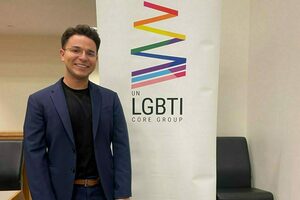
When his family moved from the United States back to Bogotá, Colombia, Matthew Bocanumenth suddenly gained a front-row seat to a historic peacebuilding project.
The administration of Colombian President Juan Manuel Santos, working with activists, experts, and civil society groups, negotiated peace with the Revolutionary Armed Forces of Colombia. And the resulting agreement, ratified in 2016, proved historic. It ended more than a half-century of armed conflict with the country’s largest guerrilla group and empowered historically marginalized constituencies, including women and the LGBTQ+ community, to meaningfully participate in the implementation of peace.
“I was living in Colombia when this peace process started,” Bocanumenth recalled. “As an adolescent, seeing the ways that the media portrayed this process and hearing different perspectives among the wider society broadened my own perspectives on what was happening and inspired my interest in global affairs—and in working to further gender-inclusive approaches to building sustainable peace.”
Now, Bocanumenth, a second-year master of global affairs with a concentration in international peace studies, works as a gender, peace, and security fellow at Outright International in New York as part of his field experience. The nongovernmental organization addresses human rights abuses against LGBTQ+ people. For him, the role is an opportunity to help the international community work more inclusively with his community.
“Lesbian, gay, bisexual, transgender, intersex, and queer people remain largely invisible in the international architecture for humanitarian, development, and peacebuilding efforts,” Bocanumenth said. “Without an intersectional gender approach in international institutions, the lived experiences of LGBTQ+ people across the world will remain obscured in research initiatives, policy agendas, and funding opportunities.”
Bocanumenth is working to change that through his field experience, building on the gender approach of the United Nations’ women, peace, and security agenda. In 2000, the United Nations Security Council adopted Resolution 1325, which established this framework. The resolution acknowledged the disproportionate ways that conflict harms women and girls, and called for women’s meaningful involvement in peacebuilding and conflict prevention. In so doing, it pushed peacebuilders to give more people a seat at the table, and ensured their work would benefit from a wider array of perspectives.
“This agenda has also provided an opportunity for activists to reinforce the call for inclusion of all women as well LGBTQ+ people of all genders in peace and security efforts,” Bocanumenth said. “By including these groups, national and international policymakers and practitioners can deepen the necessary work for addressing all forms of gender-based violence, engage more perspectives, work toward a broader consensus, and build a more sustainable peace, which is the ultimate goal.”
Bocanumenth’s time at Outright International has offered multiple ways to support this mode of inclusive peacebuilding, in part by drawing on the innovations he witnessed growing up in Colombia. Earlier this month, he co-authored an analysis of Colombia’s peace tribunal, detailing how it broke new ground by framing targeted violence against LGBTQ+ people as gender persecution and explained how other countries can address conflict by modeling similar approaches.
After his field experience wraps up in December, Bocanumenth’s capstone project will allow him to learn even more from Colombia’s peace and its inclusion of the LGBTQ+ community. The project will enable him to explore findings from the Legacy Project. Housed at the Kroc Institute for International Peace Studies, the project preserves narratives and memories compiled by the Colombian Truth Commission through an extensive multimedia archive that includes a wide diversity of voices affected by the conflict. Bocanumenth hopes that amplifying these LGBTQ+ stories can influence decision makers to change peacebuilding policies for the better.
As he reflects on his time as a master of global affairs student, Bocanumenth appreciates the training, support, and community that enable him to continue making a difference.
“It’s been an absolute blessing to be in this program. I am so grateful to the Keough School and to the Kroc Institute for providing me the financial support, the theoretical foundations, and the community for undertaking this sort of work,” Bocanumenth said. “When I talk to my classmates, there’s a sense of solidarity that we’re not in this alone, that we can all lean on each other as we work on the issues that we care about.”
Learn more about the Master of Global Affairs.
Originially published at keough.nd.edu.